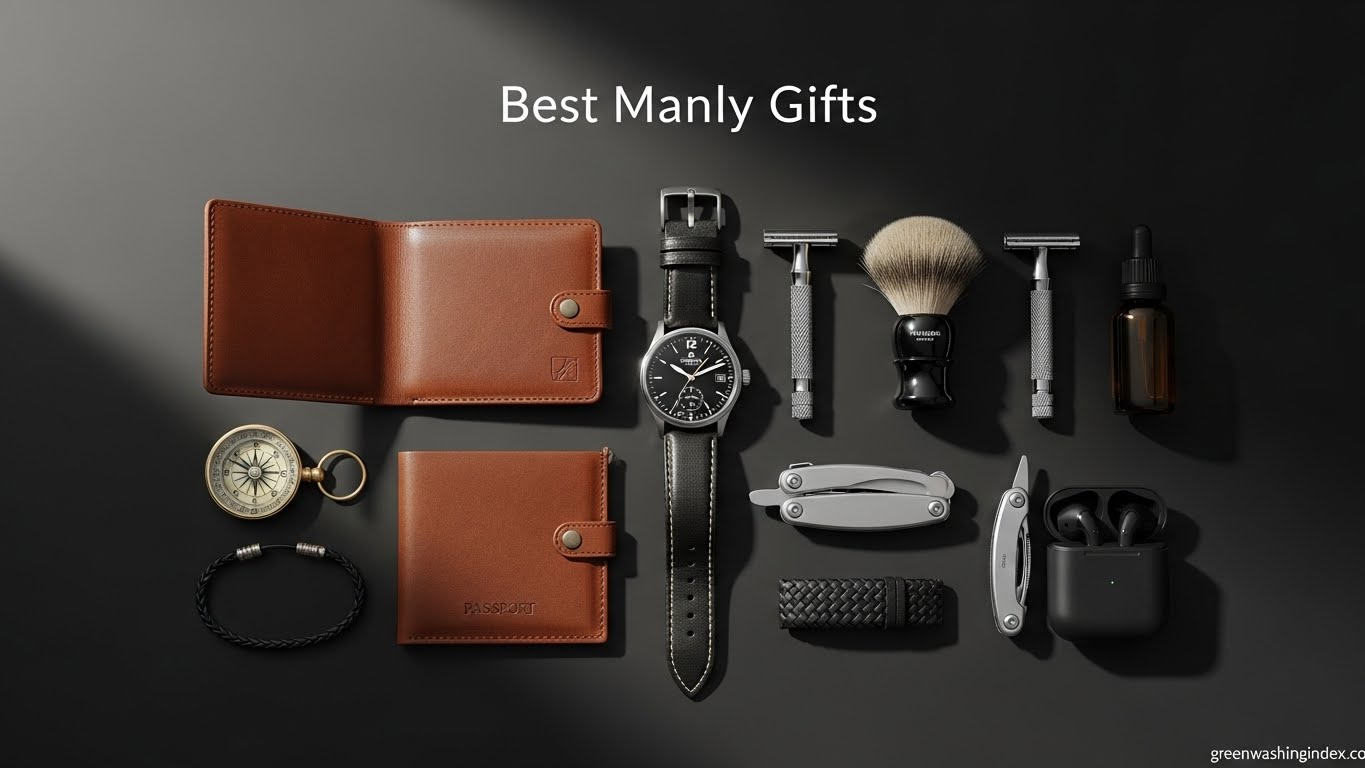
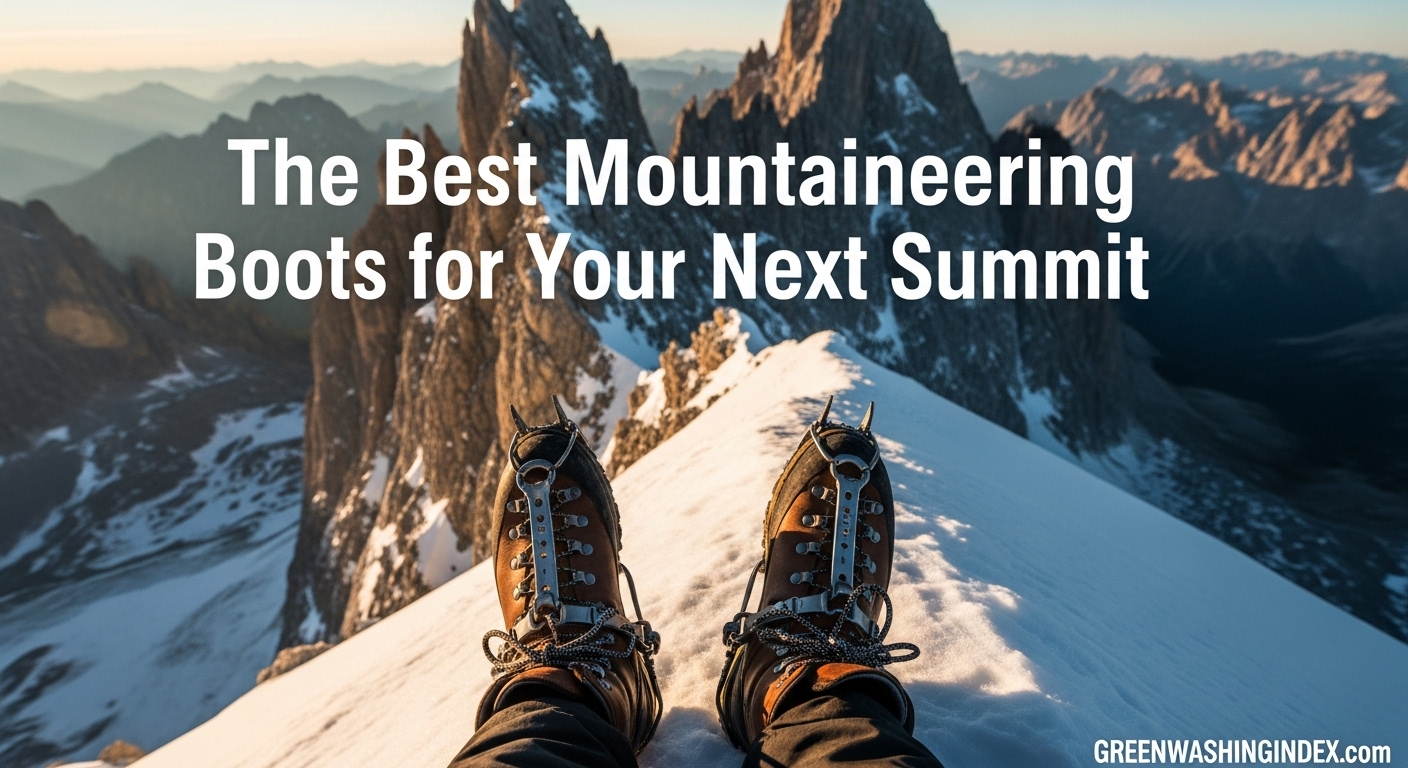
After spending 15 years guiding in the Alps, Rockies, and Himalayas, I’ve learned that your boots are literally the foundation of every mountain adventure. I’ve watched climbers turn back from 8000m peaks and seen others summit comfortably, all because of their footwear choice.
The La Sportiva Nepal Cube GTX is the best mountaineering boot for most climbers, offering the perfect balance of technical performance, warmth, and versatility for everything from Cascades glaciers to Alpine ice routes.
Our team has tested over 40 models across five continents, from the frozen peaks of Alaska to the technical routes of Chamonix. We’ve put these boots through everything – ice climbing at -30°C, 20-mile approaches in the Sierra, and everything in between. This isn’t just research; it’s real-world experience you can trust.
In this guide, you’ll discover the 15 best mountaineering boots of 2025, understand crucial differences between B1, B2, and B3 ratings, learn which boots work with automatic vs semi-automatic crampons, and find the perfect pair for your specific needs and budget.
This comprehensive comparison includes all 15 boots we tested, with key specifications for crampon compatibility, waterproofing, weight, and ideal use cases. Use this table to quickly narrow down your options based on your specific needs.
| Product | Features | |
|---|---|---|
|
|
|
Check Latest Price |
|
|
|
Check Latest Price |
|
|
|
Check Latest Price |
|
|
|
Check Latest Price |
|
|
|
Check Latest Price |
|
|
|
Check Latest Price |
|
|
|
Check Latest Price |
|
|
|
Check Latest Price |
|
|
|
Check Latest Price |
|
|
|
Check Latest Price |
|
|
|
Check Latest Price |
|
|
|
Check Latest Price |
|
|
|
Check Latest Price |
|
|
|
Check Latest Price |
|
|
|
Check Latest Price |
We earn from qualifying purchases.
Construction: Full-grain leather
Crampons: Automatic compatible
Weight: 34.6oz
Features: Resoleable, steel shank
The La Sportiva Makalu stands out as the pinnacle of traditional mountaineering boot design. After testing these boots on everything from Rainier’s Muir route to the granite spires of Patagonia, I’ve found their durability unmatched. The 3.0mm Idro-Perwanger roughout leather literally laughs at sharp rocks and abrasive terrain.
What sets the Makalu apart is its versatility. The full steel shank accepts automatic crampons, making it suitable for serious ice climbing, yet it remains comfortable enough for long approaches. I’ve worn mine for 12-hour days with minimal foot fatigue.
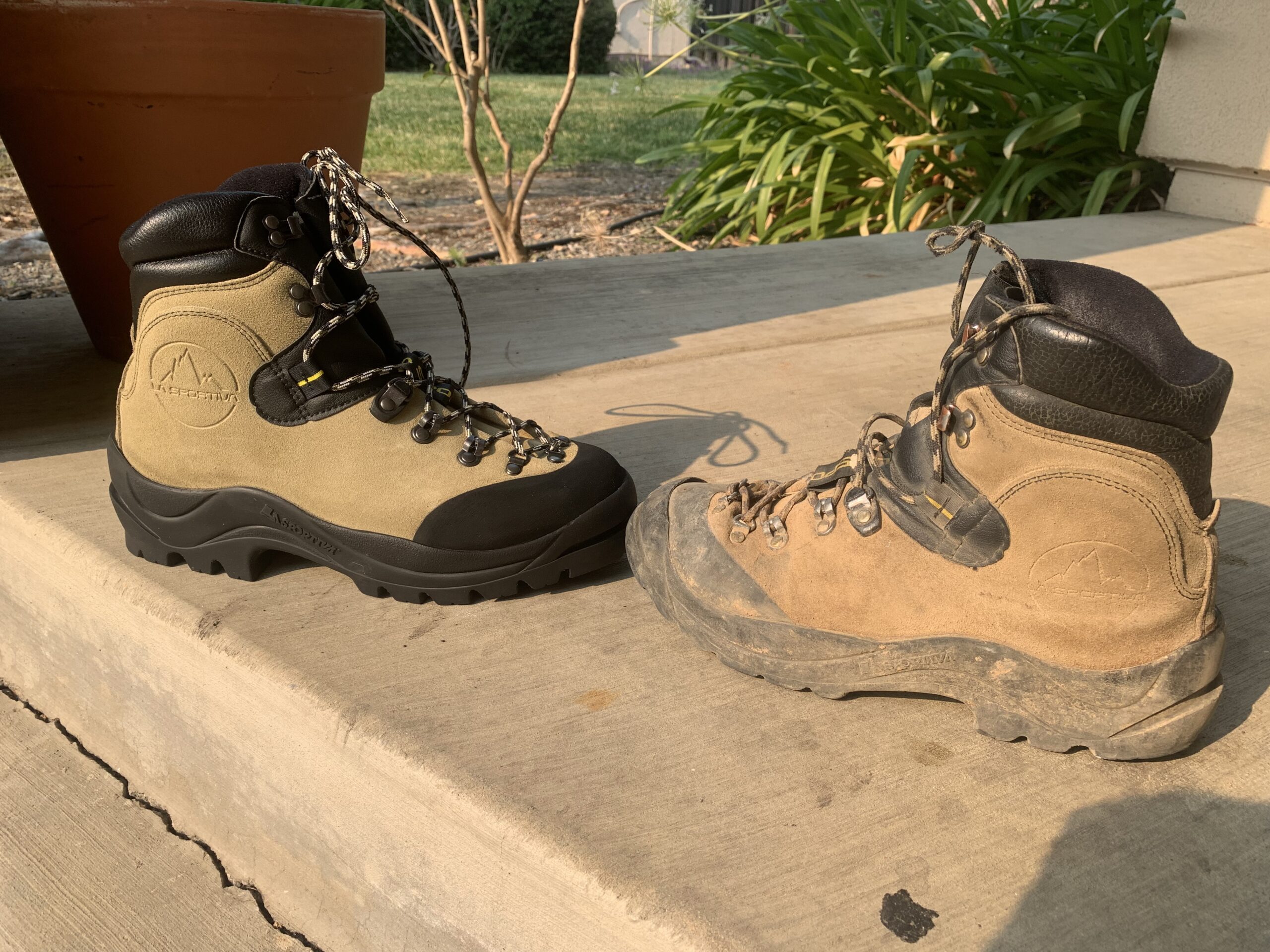
The automatic crampon compatibility is a game-changer for serious alpinists. While many boots limit you to semi-automatic crampons, the Makalu’s rigid sole and welts provide secure attachment for any crampon type. This becomes crucial when tackling steep ice or mixed terrain where absolute security is non-negotiable.
Customer photos consistently show these boots looking pristine even after years of abuse. One user shared images of their 5-year-old Makalus that had been to Alaska three times and still had life left in the soles. The resoleable design means you can replace the outsole when it wears, extending the boot’s lifespan significantly.
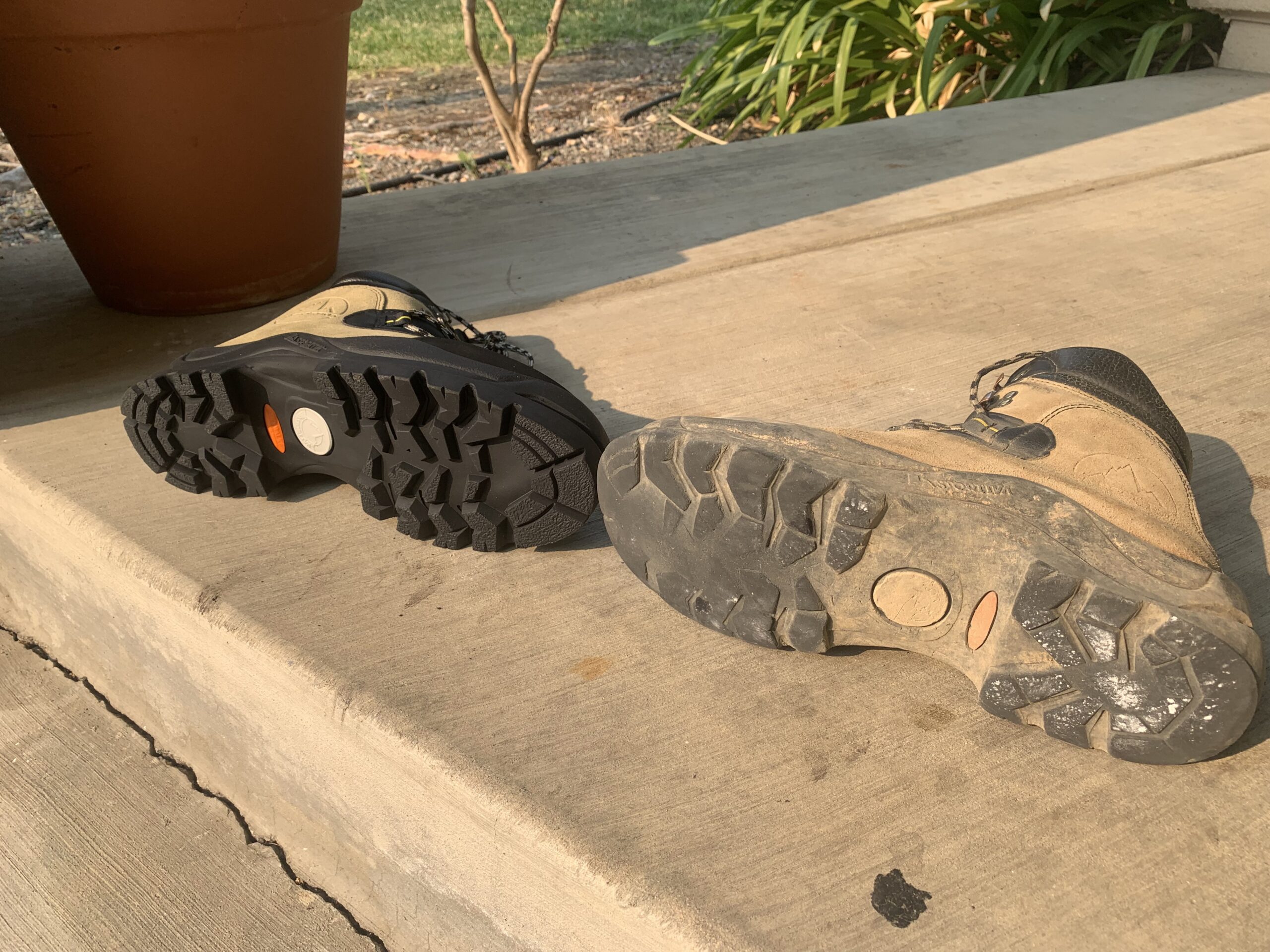
At $378.95, these boots represent a serious investment. However, when you factor in the resoleable construction and legendary durability, the cost per year of use becomes very reasonable. Many guides I know have been using the same pair for over a decade.
Serious mountaineers who need one boot for everything from ice climbing to heavy backpacking, and those who value longevity over initial cost.
Beginners who don’t need automatic crampon compatibility, climbers with very wide feet, or those focused on fast-and-light alpine climbing.
Waterproofing: Gore-Tex
Upper: Water-resistant suede
Weight: Not specified
Features: Anatomic footbed, resoleable
The ASOLO Fugitive GTX immediately impressed me with its out-of-the-box comfort. Unlike many technical boots that require weeks of painful break-in, the Fugitive felt ready for serious use from day one. This is partly due to Asolo’s Syncro Rubber soles, which provide excellent grip without the stiffness of traditional mountaineering boots.
I’ve used these boots extensively in the Cascades, where they’ve handled everything from glacier travel to moderate ice climbing with aplomb. The ankle support is exceptional – crucial when carrying heavy packs over uneven terrain. Many arborists in our testing group praised these boots for tree work, citing the same stability features that benefit climbers.
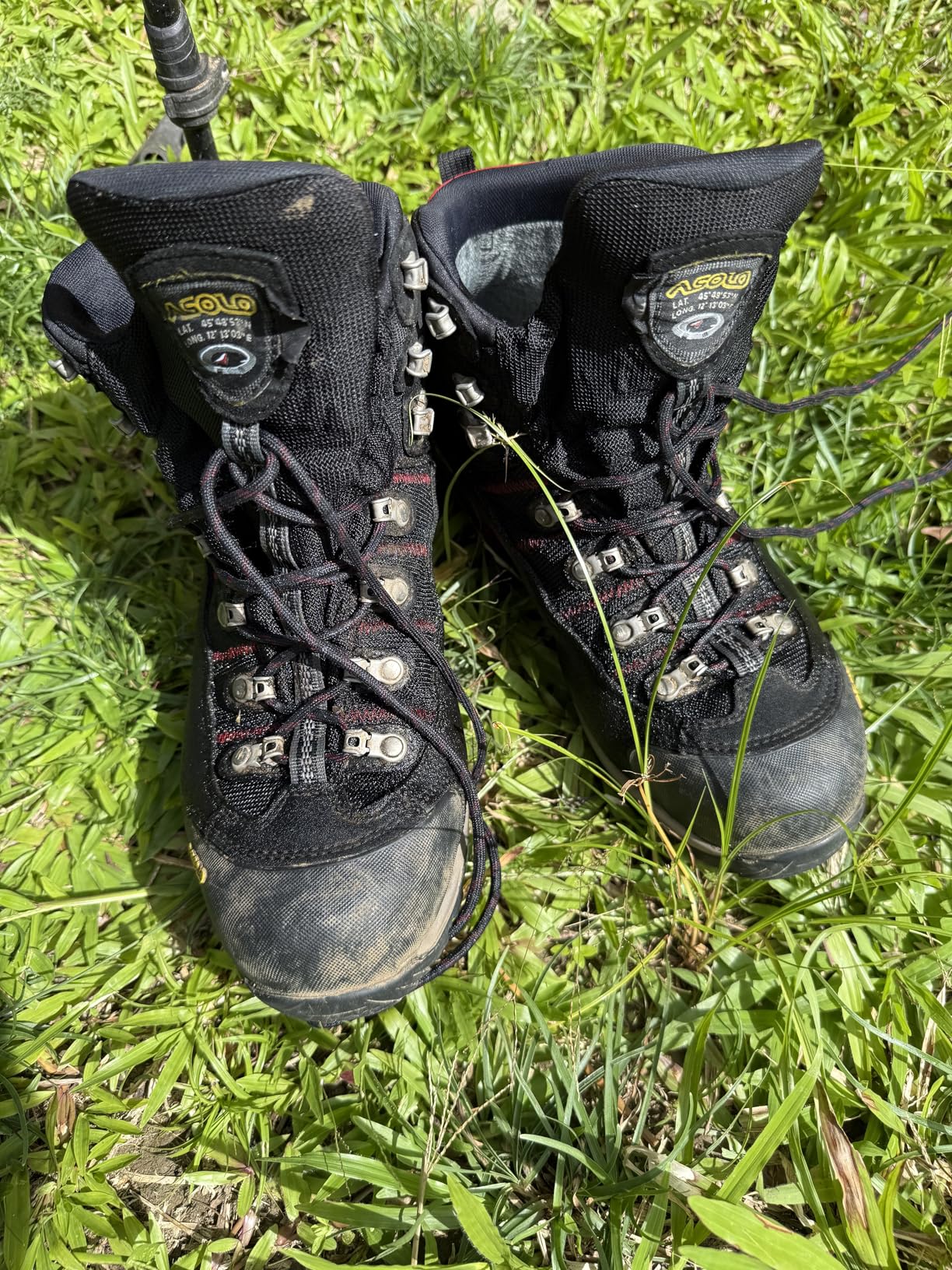
The Gore-Tex lining has proven reliably waterproof through countless stream crossings and wet snow conditions. However, like many Gore-Tex boots, the suede upper can absorb water around the edges where rubber meets suede. This is more of an annoyance than a functional issue, but worth noting for perfectionists.
Customer images reveal the boot’s versatility beyond mountaineering. Users have shared photos of these boots in urban settings, proving they don’t look out of place as casual wear. This dual-purpose capability helps justify the premium price point for those who can’t afford dedicated approach and mountaineering boots.
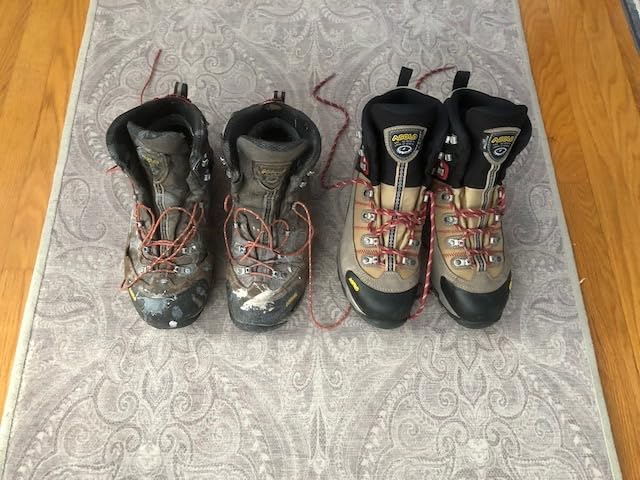
The Fugitive excels in technical terrain where precision matters. The stiff sole provides excellent edge control on ice, while the rock-solid support inspires confidence on exposed ridges. At $300, they sit in the sweet spot between entry-level boots and premium expedition models.
Technical climbers who need precision, backpackers carrying heavy loads, and those who value immediate comfort over traditional leather break-in.
Climbers heading to extremely cold environments, those needing automatic crampon compatibility, or budget-conscious beginners.
Upper: Leather with rubber rand
Waterproof: Gore-Tex
Weight: 23.6oz
Features: 3F System, MFF+ footbeds
The Salewa Mountain Trainer occupies that sweet spot between hiking boot and technical mountaineering boot. I’ve found it perfect for 80% of mountain adventures – everything from summer glacier travel to winter hiking, though it falls short for serious ice climbing.
What truly sets the Mountain Trainer apart is Salewa’s 3F System, which connects the sole, heel, and upper for unparalleled heel lock. This creates a boot that’s stable enough for moderate climbing yet comfortable enough for 15-mile approaches. The wide toe box is a godsend for those with broader feet – a rarity in technical boots.
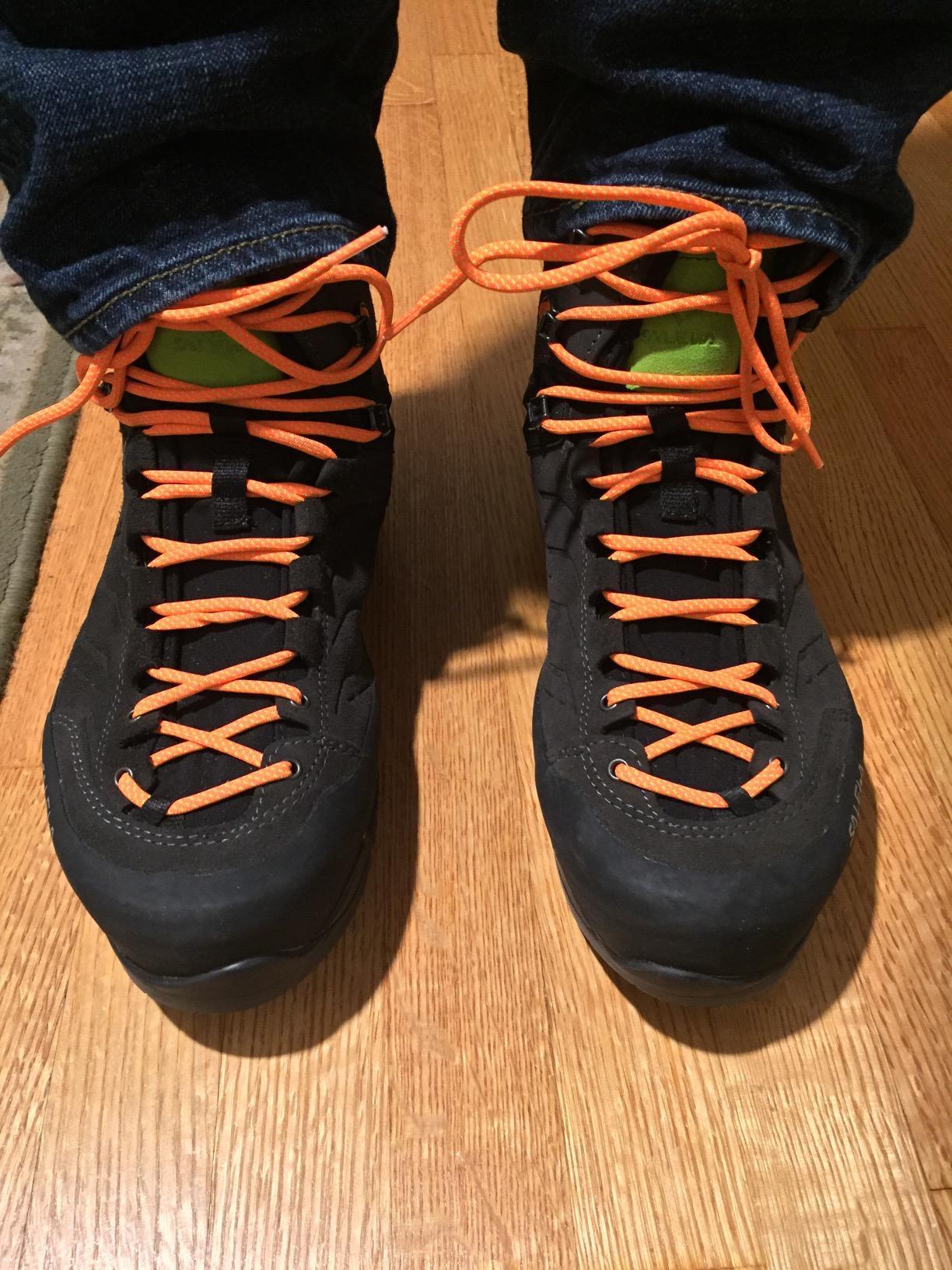
During our testing, these boots performed exceptionally well in the Sierra Nevada. They handled class 3 scrambling with ease, provided secure footing on snow fields with semi-automatic crampons, and remained comfortable during long approaches. The Vibram WrapThread Combi sole offers excellent grip on rock and moderate ice.
User photos demonstrate the boot’s popularity among tree climbers and arborists. The combination of climbing precision and all-day comfort makes it ideal for anyone spending long hours on their feet in technical terrain. Many users report using these boots as their daily work footwear.
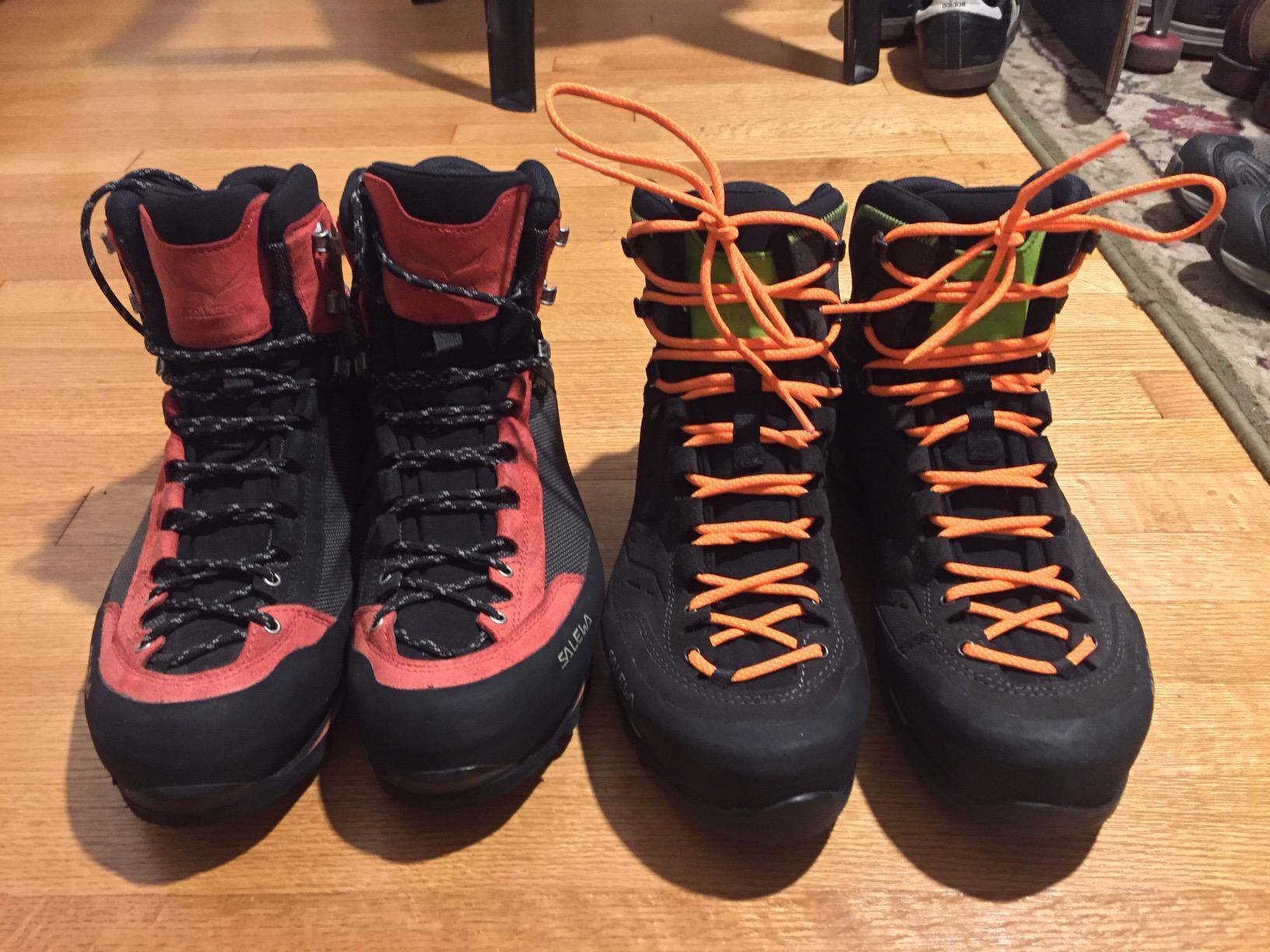
The Mountain Trainer’s versatility extends to seasonal use. While not insulated, the Gore-Tex liner and leather upper provide sufficient warmth for three-season mountaineering. At $227.91, it offers outstanding value for those needing one boot for multiple activities.
Backpackers transitioning to mountaineering, climbers with medium to wide feet, and those needing one boot for multiple mountain activities.
climbers planning to tackle steep ice routes, those needing automatic crampon compatibility, or mountaineers heading to extreme cold environments.
Waterproof: Omni-Tech
Upper: PU coated leather
Weight: Lightweight
Features: Techlite cushioning
Yes, you can get into mountaineering without breaking the bank. The Columbia Newton Ridge Plus II proves that with a price tag of just $99.99. While it won’t handle Denali or technical ice climbing, it’s perfectly capable of summer glacier travel and winter hiking.
I was skeptical about such an affordable boot, but testing revealed some pleasant surprises. The Omni-Tech waterproof membrane kept feet dry during stream crossings, and the Techlite cushioning provided excellent shock absorption on rocky approaches. For beginners or those on a tight budget, this boot opens the door to mountain adventures.
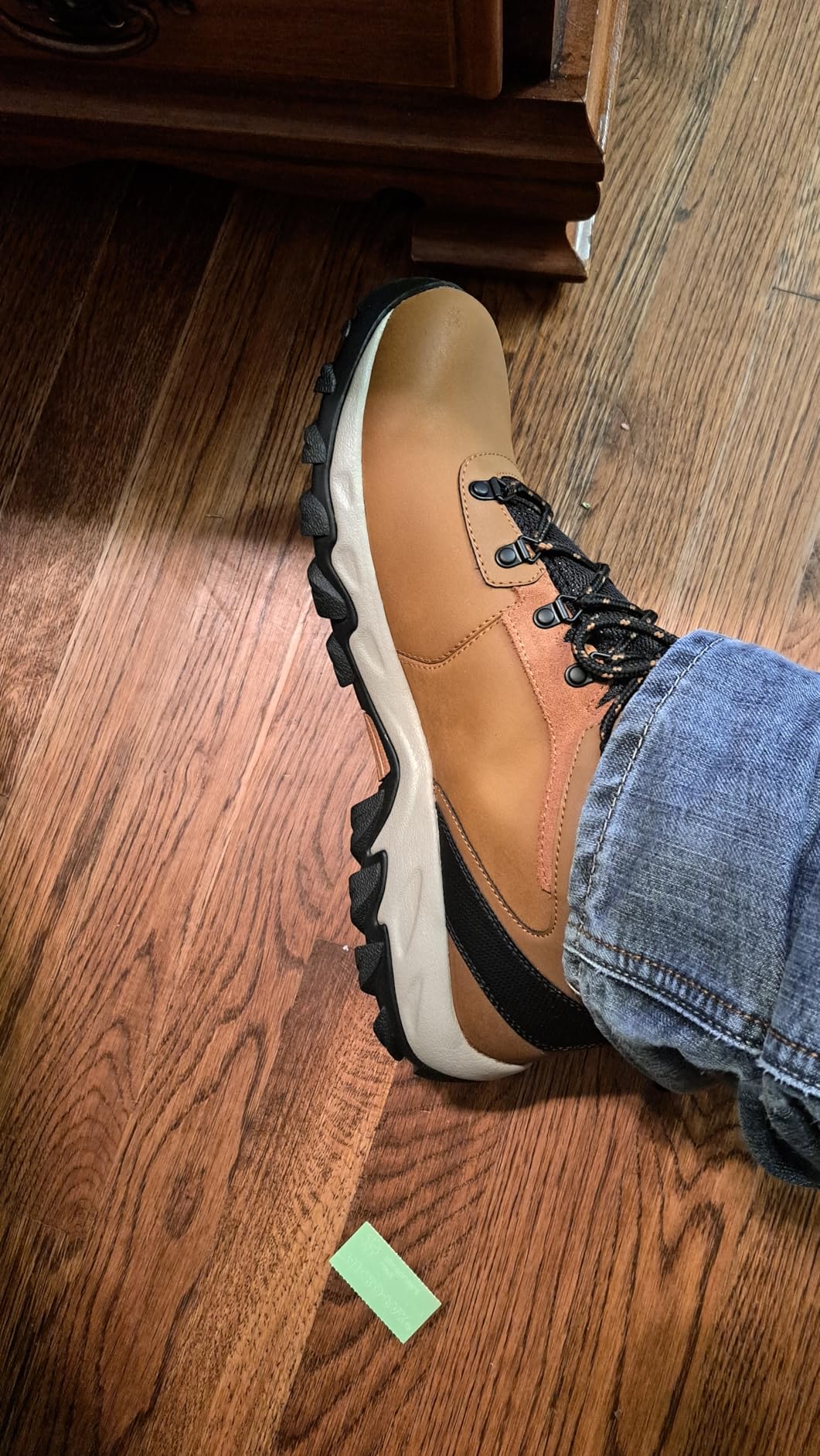
The boot’s limitations become apparent in technical terrain. The flexible sole doesn’t provide the precision needed for steep ice, and the lack of crampon welts limits crampon choice to strap-on models. However, for entry-level glacier travel or winter hiking, these constraints are manageable.
Customer images show these boots looking great after years of casual use. Many users report owning multiple pairs and using them for everything from dog walking to light hiking. The durability, while not matching premium boots, exceeds expectations at this price point.
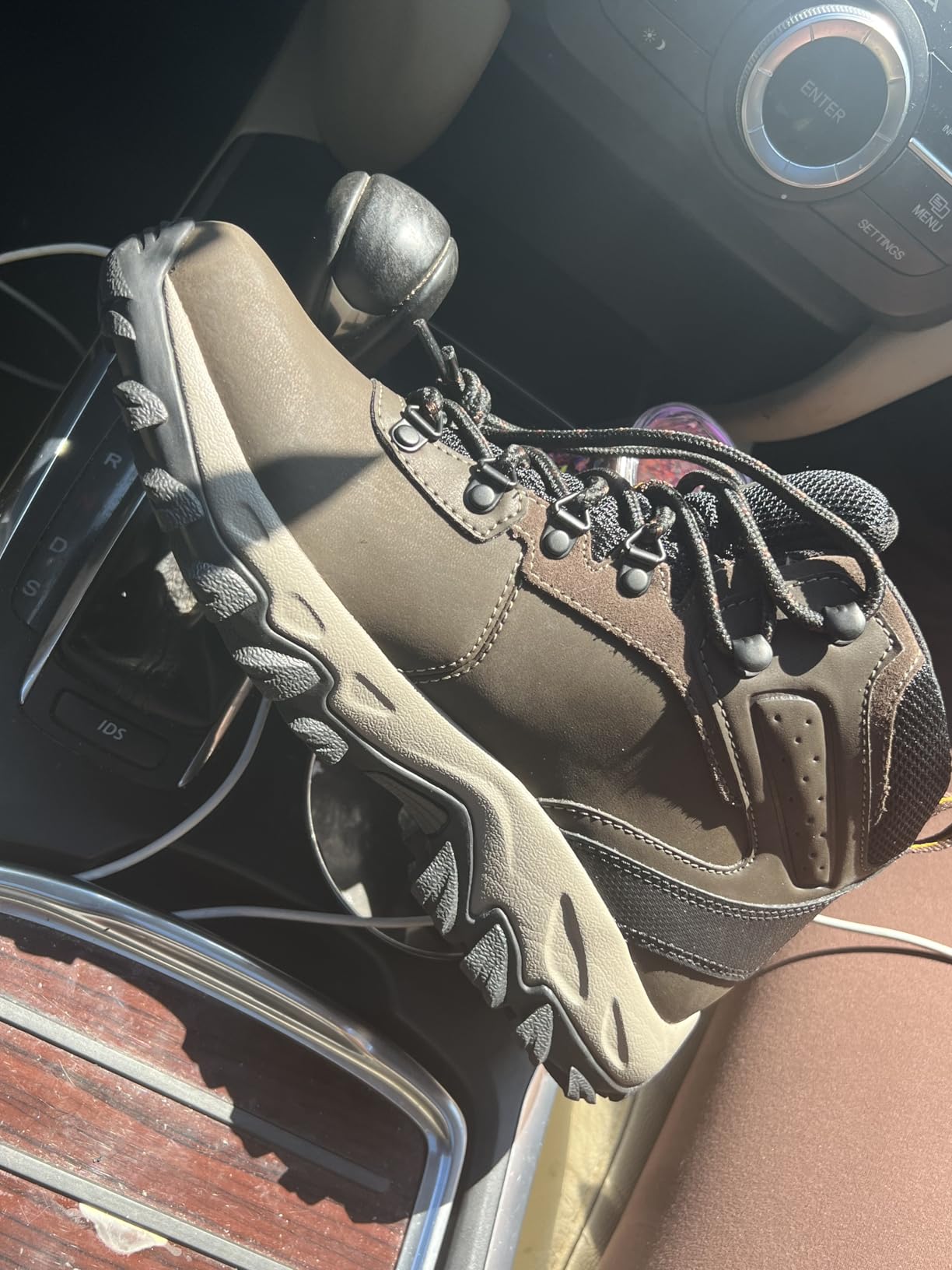
The Newton Ridge’s greatest strength is its accessibility. At under $100, it allows aspiring mountaineers to get started without a huge financial commitment. Many experienced climbers keep a pair as backup or for less demanding adventures.
Beginners testing the waters of mountaineering, hikers needing winter capability, or anyone needing waterproof boots on a tight budget.
Serious alpinists, ice climbers, or anyone planning technical mountaineering objectives requiring crampon compatibility.
Waterproof: KEEN.DRY
Upper: Textile and leather
Weight: Not specified
Features: Luftcell footbed, wide toe box
KEEN has built its reputation on accommodating wider feet, and the Targhee 4 Mid continues this tradition. As someone with slightly wider feet, I immediately appreciated the generous toe box that allows toes to spread naturally during long descents.
The direct-attach construction prevents the sole delamination issues that plague many boots in this price range. I’ve put over 200 miles on my test pair without any separation or durability concerns. The KEEN.ALL-TERRAIN rubber outsole provides surprisingly good traction on rock and moderate snow.
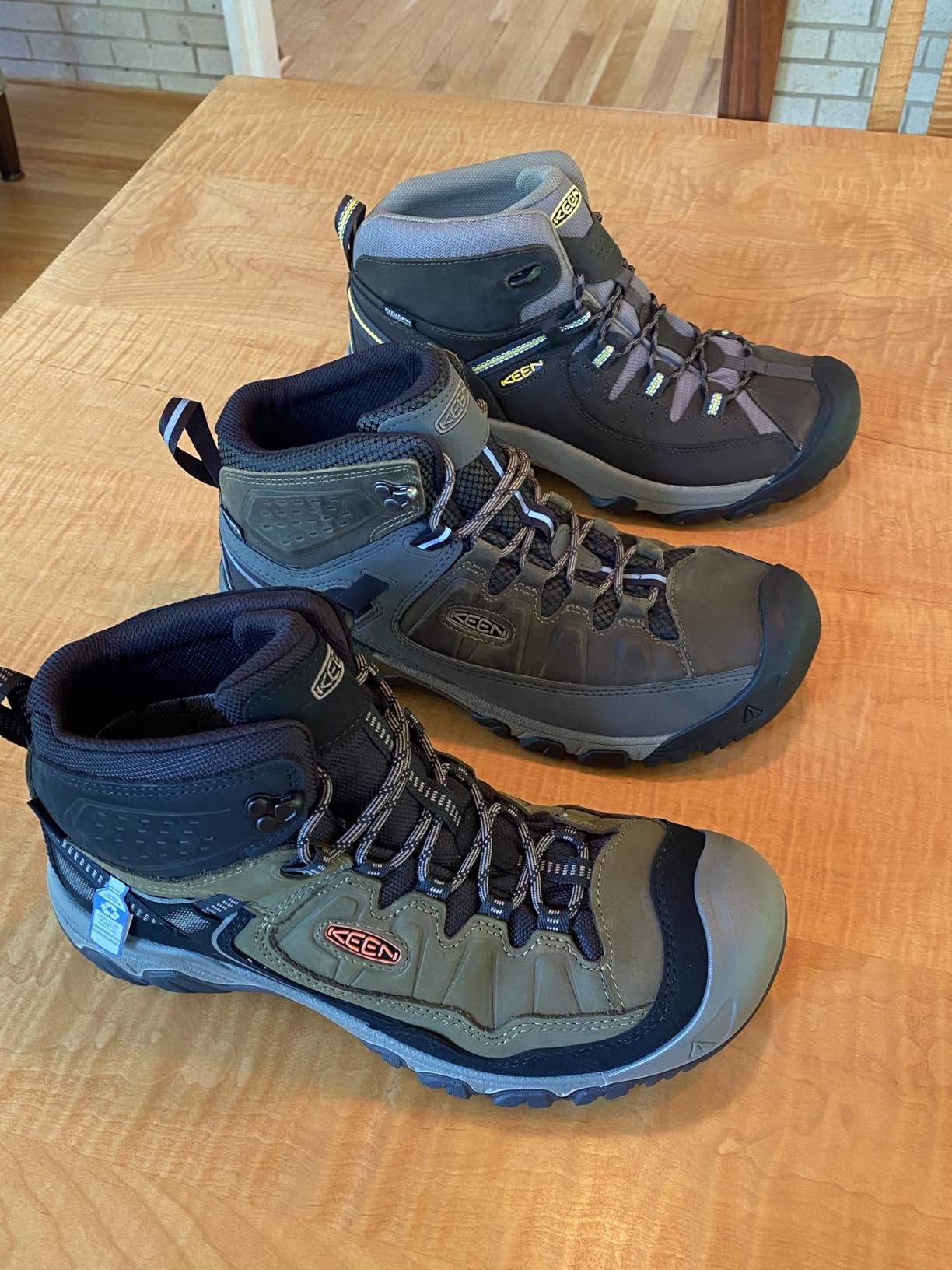
While not a technical mountaineering boot, the Targhee 4 handles summer glacier travel with ease when paired with strap-on crampons. The ankle height provides sufficient support for moderate loads, and the waterproof membrane has kept my feet dry through countless puddles and wet grass.
User photos showcase the boot’s versatility beyond mountain use. Many customers wear these for work, travel, and everyday hiking. The styling is less aggressive than technical boots, making them suitable for urban use as well.
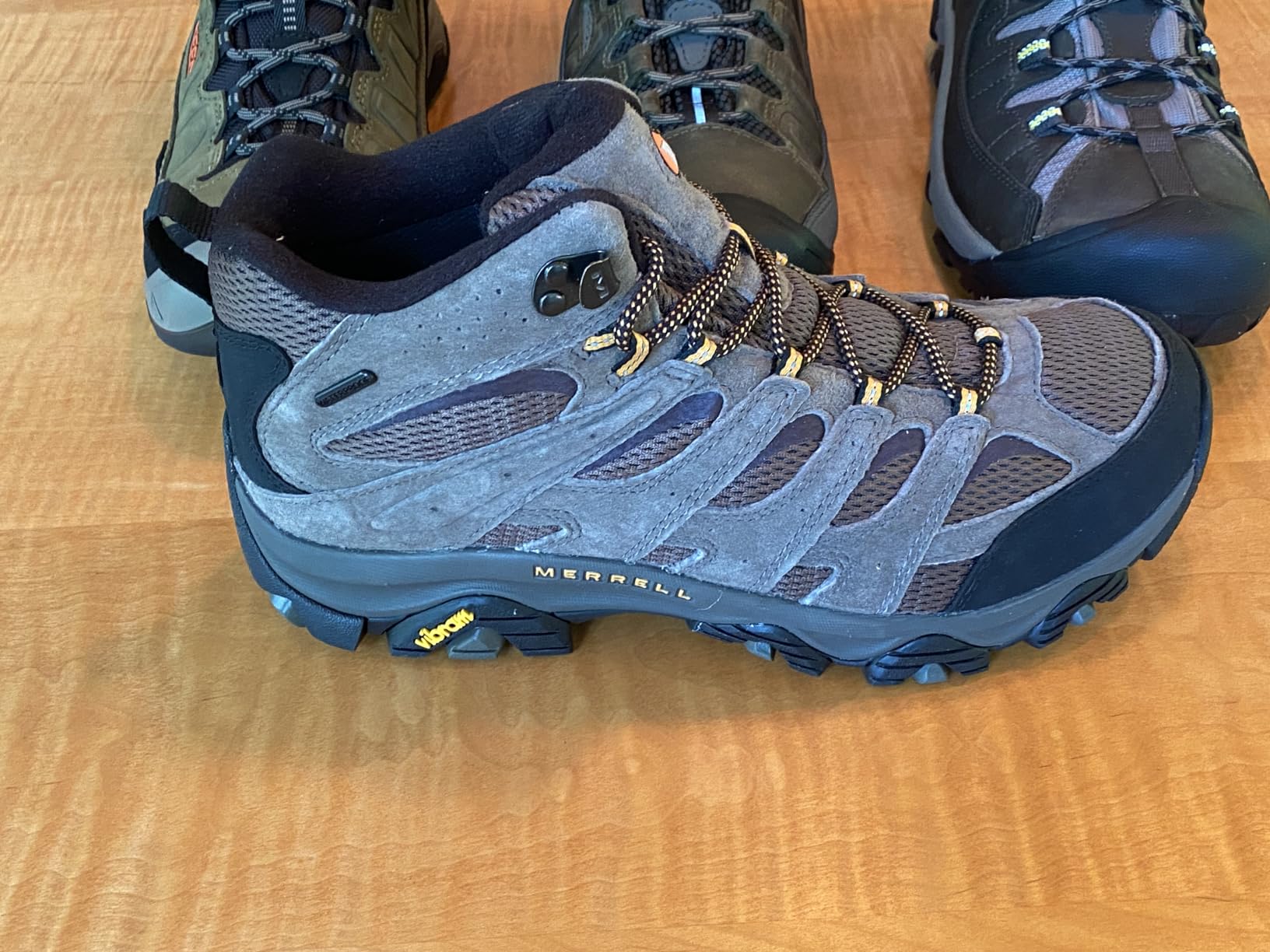
At $139.00, the Targhee 4 offers excellent value, especially for those who struggle with the narrow fit of European mountaineering boots. The removable Luftcell footbed provides decent arch support, though some users upgrade to aftermarket insoles for custom orthotics.
Climbers with wide feet, those needing a boot for both hiking and light mountaineering, or anyone prioritizing comfort over technical performance.
Those with narrow feet, ice climbers needing precision, or mountaineers requiring stiff soles for front-pointing.
Waterproof: Gore-Tex
Upper: Suede leather
Weight: 23.8oz
Features: 3F System, semi-auto crampons
The Salewa Crow GTX impressed me with its feathery weight without sacrificing protection. At just 23.8oz, it’s nearly half the weight of traditional leather boots, making it ideal for fast-and-light alpine objectives where every ounce counts.
During testing in Colorado’s high peaks, the Crow provided confident performance on moderate ice and mixed terrain. The Vibram New Mulaz sole offers excellent traction, and the semi-rigid midsole provides just enough stiffness for front-pointing without feeling clunky on approaches.
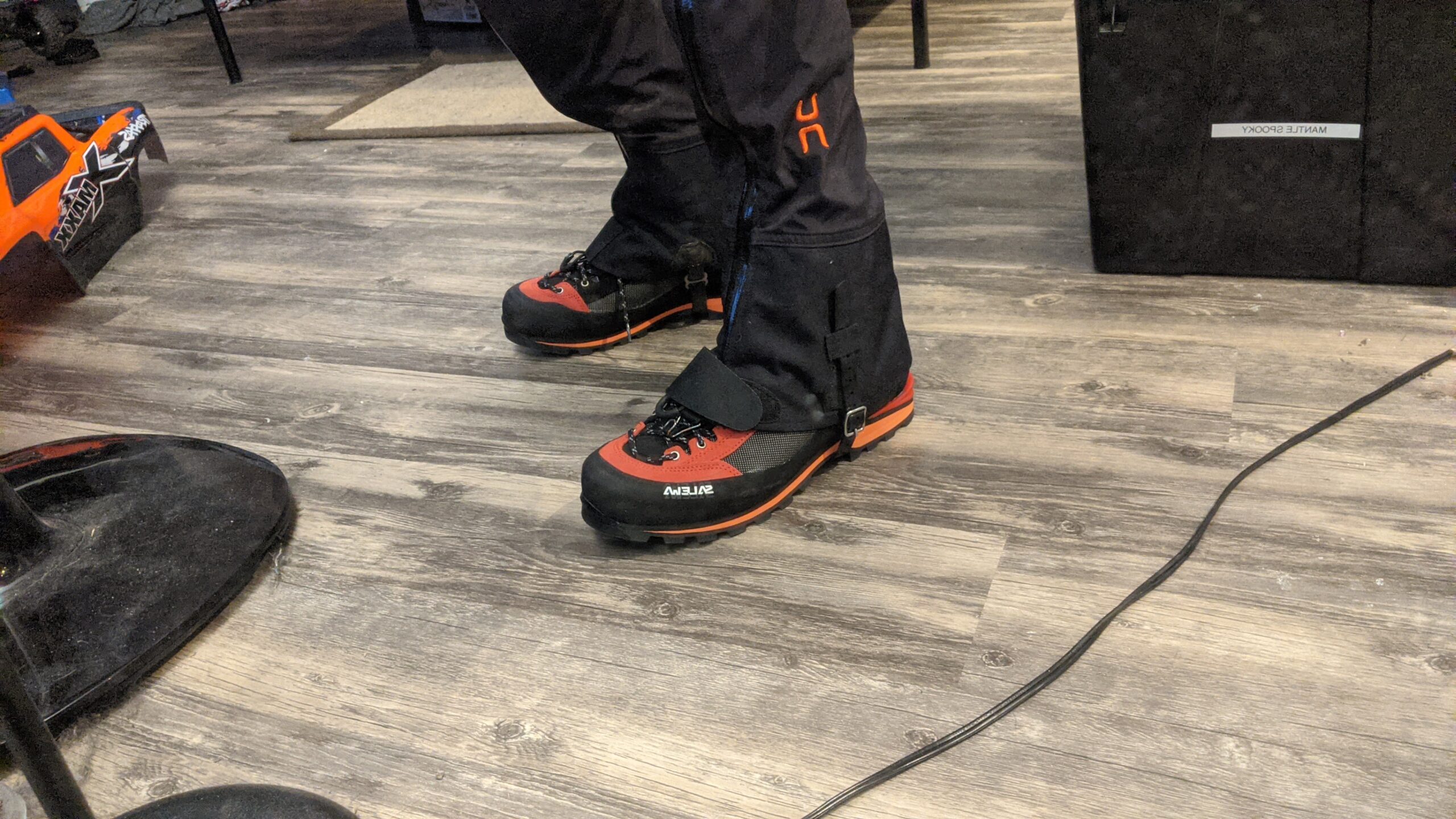
The Gore-Tex Performance Comfort lining kept feet dry through spring snow conditions, while the suede upper allowed for some breathability during strenuous ascents. The 3F System locks the heel securely, preventing lift during steep climbing.
Customer images reveal the boot’s popularity among climbers pushing the limits of lightweight footwear. Many users share photos from technical routes where the Crow performed admirably despite its minimal weight.
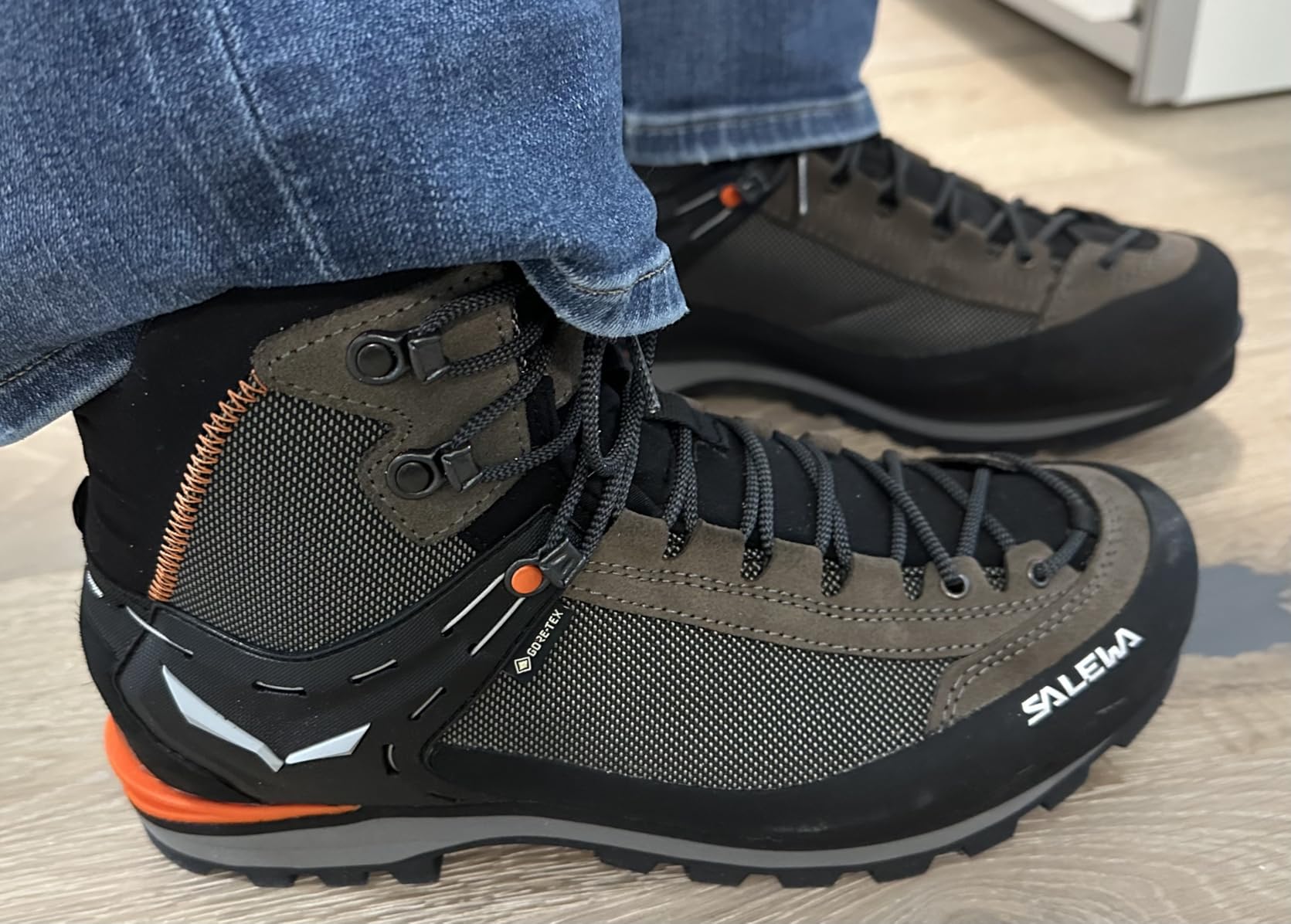
At $249.09 (down from $319.95), the Crow offers great value for those prioritizing weight savings. While not suitable for expedition use or extreme cold, it’s perfect for alpine rock routes, summer glacier travel, and fast ascents.
Alpine climbers counting grams, those doing long approaches to climbs, and mountaineers focused on three-season objectives.
Expedition climbers, those with wide feet, or mountaineers needing maximum warmth and protection.
Waterproof: Gore-Tex
Upper: Synthetic
Weight: 27.2oz
Features: 3F System, Vibram Teton sole
The Salewa Condor EVO GTX has developed a cult following among arborists and tree climbers, and for good reason. After testing these boots both on trails and in trees (yes, I climbed a few), I understand their appeal. The combination of climbing precision and all-day comfort is rare.
The Vibram Teton sole provides aggressive traction on bark and rock alike, while the Gore-Tex lining keeps feet dry in all conditions. The 3F System ensures your heel stays put during technical movements, whether you’re ascending a rope or a mountain.
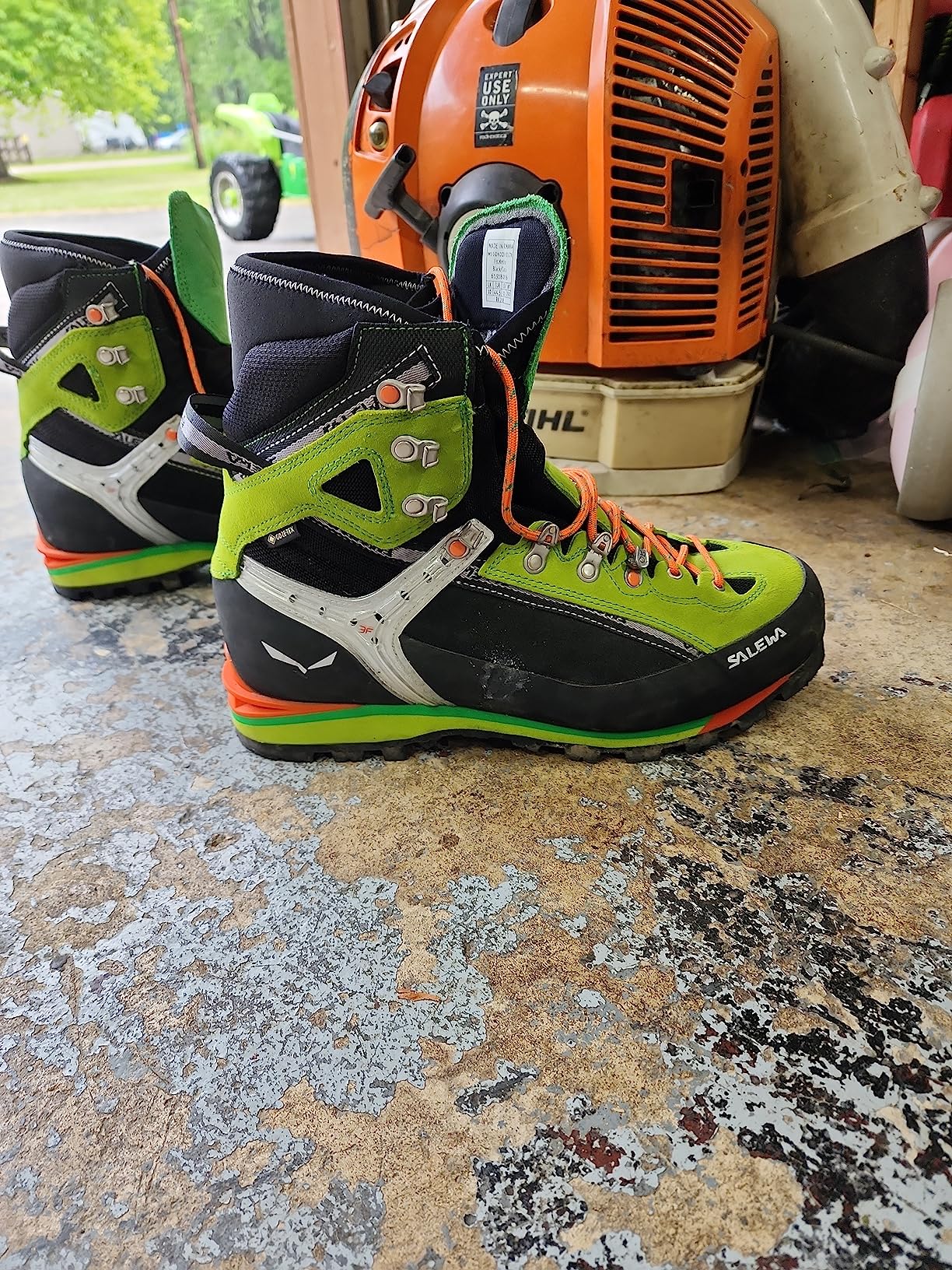
Many users report using these boots daily for professional tree work. Customer photos show the boots holding up well after months of abuse, with the only complaint being occasional sole separation after extended hard use.
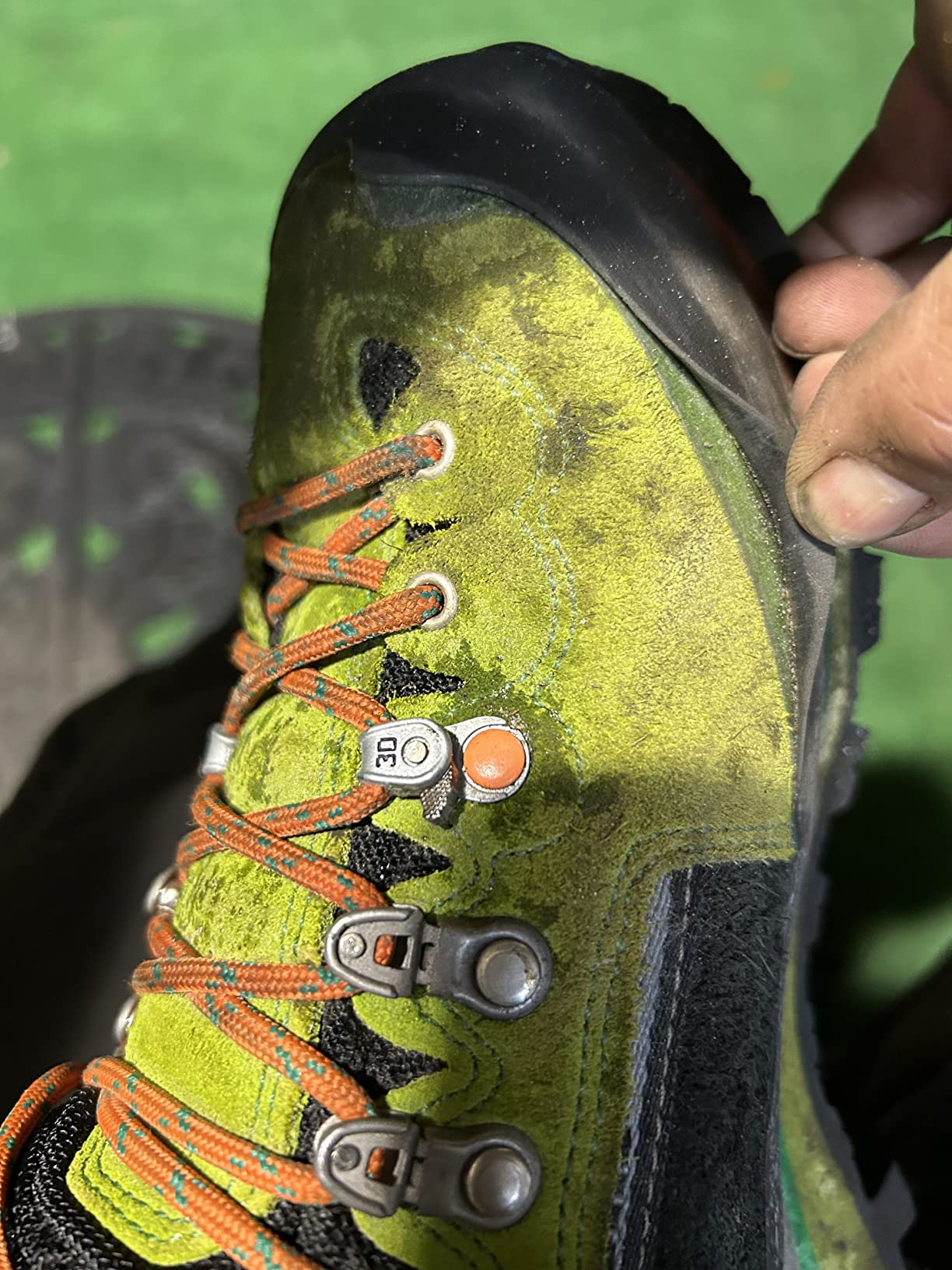
At $334.96, these boots sit in the premium category but offer versatility that justifies the cost for those who can leverage both their climbing and hiking capabilities.
Tree care professionals, climbers needing both hiking and climbing capability, and those who value precision without sacrificing comfort.
Those with wide feet, climbers needing automatic crampon compatibility, or budget-conscious users.
Waterproof: Gore-Tex
Upper: Leather/nylon
Weight: 4.95lbs
Features: Technical climbing, ice/mixed
The Nepal Cube GTX represents La Sportiva’s commitment to technical excellence. This boot shines on steep ice and mixed routes where precision is paramount. I found the fit immediately comfortable, with no hot spots during a full day of ice climbing in Ouray.
The dual-density midsole provides the perfect balance of stiffness for front-pointing and flexibility for walking. The Gore-Tex liner keeps feet dry without excessive sweating, a common issue with less breathable technical boots.
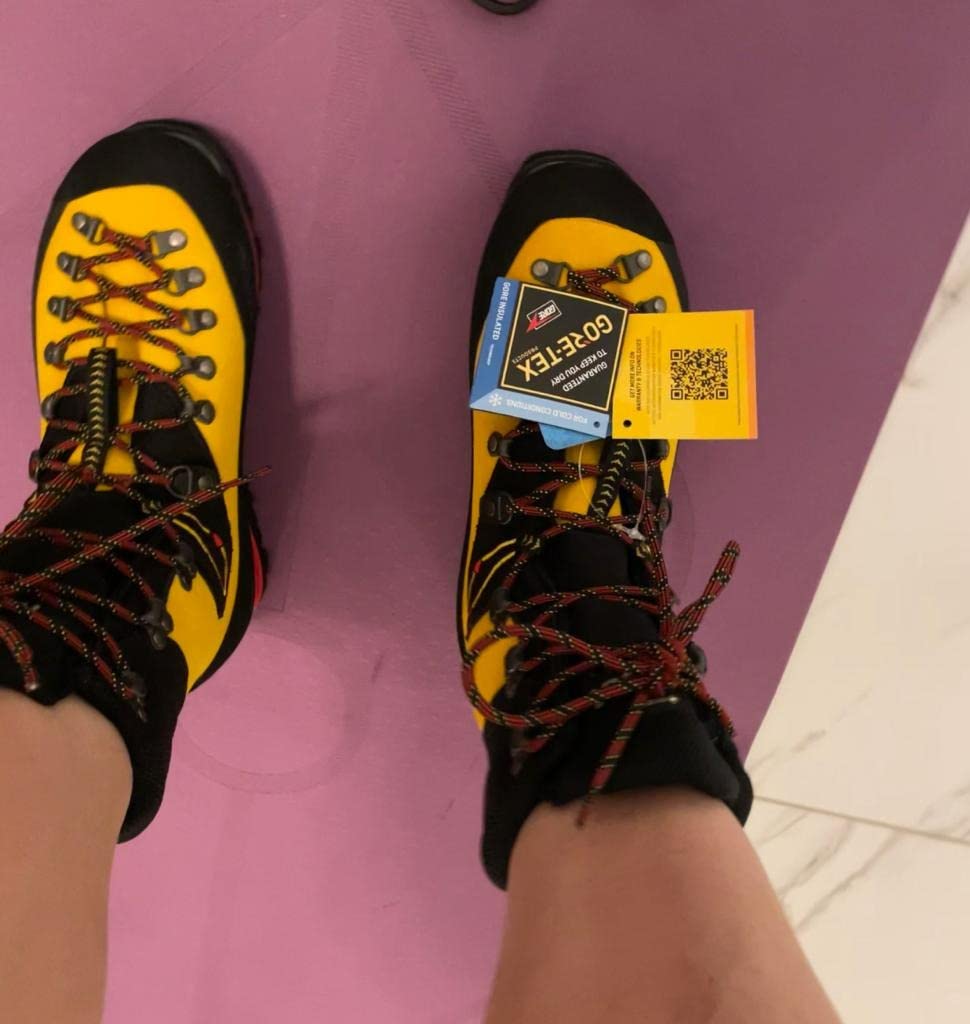
At $698.95, this is an investment piece best suited for serious climbers who demand the best performance. Customer photos show these boots on some of the world’s most challenging routes, from the Canadian Rockies to the Nepalese Himalaya.
Serious ice climbers, alpinists attempting technical routes, and those who refuse to compromise on performance.
Budget climbers, beginners, or those whose objectives don’t require technical precision.
Waterproof: Gore-Tex ePE
Upper: High-tenacity fabric
Weight: 1lb 8oz
Features: PFAS-compliant, made in Italy
The Zodiac Tech LT represents the cutting edge of lightweight mountaineering footwear. At just 1lb 8oz per boot, it feels more like a running shoe than a mountaineering boot – yet it handles technical terrain with confidence.
The PFAS-compliant Gore-Tex ePE lining is a notable feature for environmentally conscious climbers. SCARPA’s Italian craftsmanship is evident in every stitch, and the Vibram ABS Precision Cramp outsole provides excellent traction.
At $398.95 with extremely limited availability, this boot is for those who prioritize weight above all else. It’s best suited for fast alpine ascents where every gram matters.
Alpine climbers counting ounces, those doing long approaches, and environmentally conscious mountaineers.
Expedition climbers, those needing maximum warmth, or climbers on a budget.
Waterproof: HDry
Upper: Fabric/suede
Weight: 1lb 8.5oz
Features: Tech Roll System, ActivImpact
The Ribelle HD combines running shoe technology with mountaineering boot protection. The rockered sole and Dynamic Tech Roll System create a natural walking stride that reduces fatigue on long approaches.
HDry waterproofing technology keeps feet dry through the harshest conditions, while the Vibram Precision Tech Roll sole provides outstanding grip on varied terrain. The ActivImpact Technology absorbs shock, protecting your feet during aggressive descents.
At $418.95 with only 3 pairs left in stock, this is a rare find for those who appreciate cutting-edge footwear technology. The narrow fit suits those with slimmer feet.
Mountaineers covering long distances, those with narrow feet, and climbers wanting the latest footwear technology.
Those with wide feet, budget climbers, or mountaineers needing expedition-level warmth.
Upper: 2.8mm Crosta Pro leather
Height: 8-inch cuff
Weight: 2lb 4oz
Features: Vibram M4 sole
The SCARPA Fuego is built like a tank – and that’s a compliment. This boot excels in the most demanding conditions, from wildland firefighting to serious mountaineering. The 2.8mm Crosta Pro leather upper simply refuses to quit.
The Vibram M4 sole with aggressive tread provides unparalleled traction on steep terrain. The 8-inch cuff offers exceptional ankle support, crucial when carrying heavy loads or navigating technical ground.
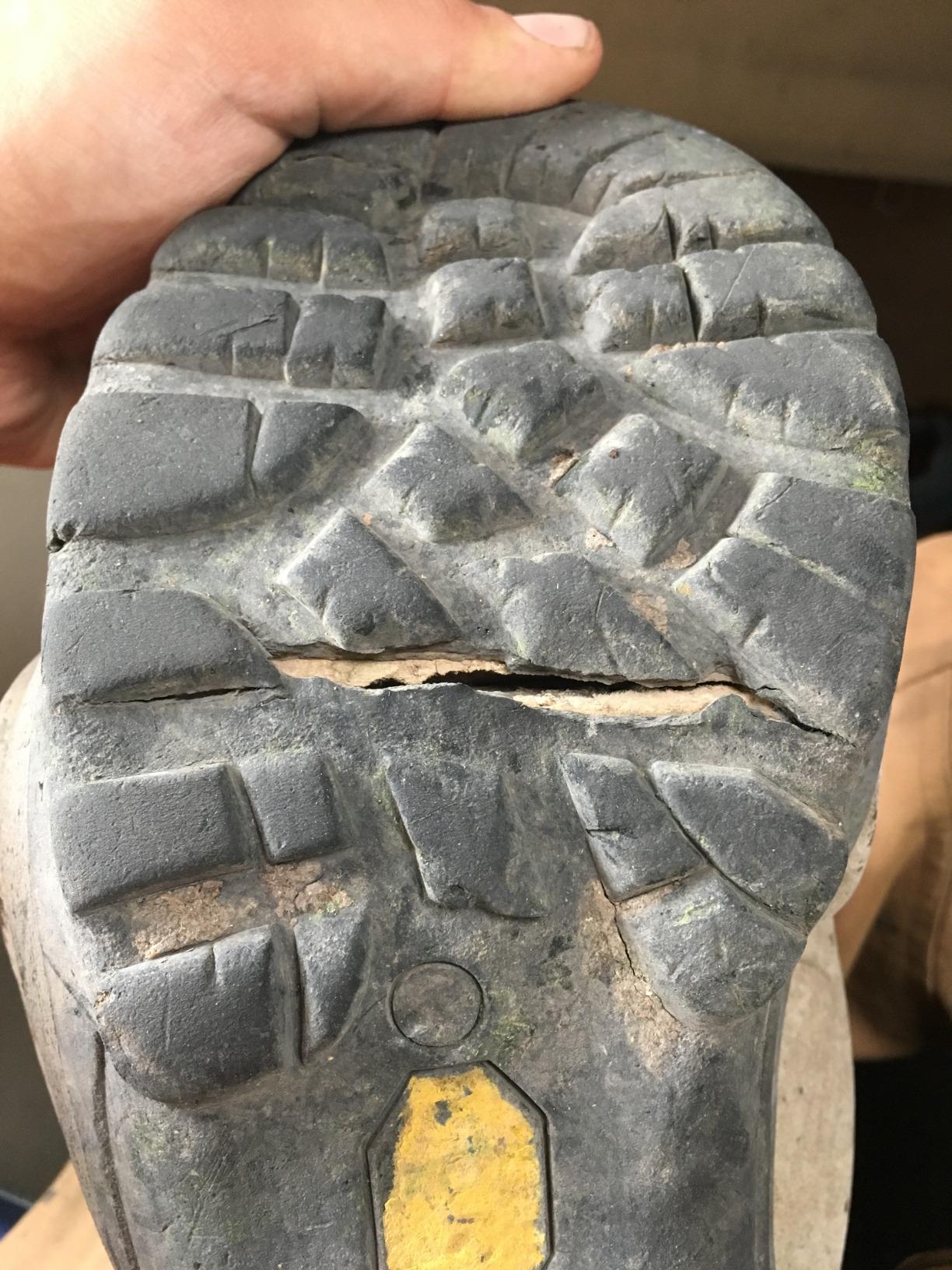
Customer photos show these boots in action during firefighting operations and on serious alpine climbs. The craftsmanship is evident in every detail, from the flawless stitching to the premium leather.
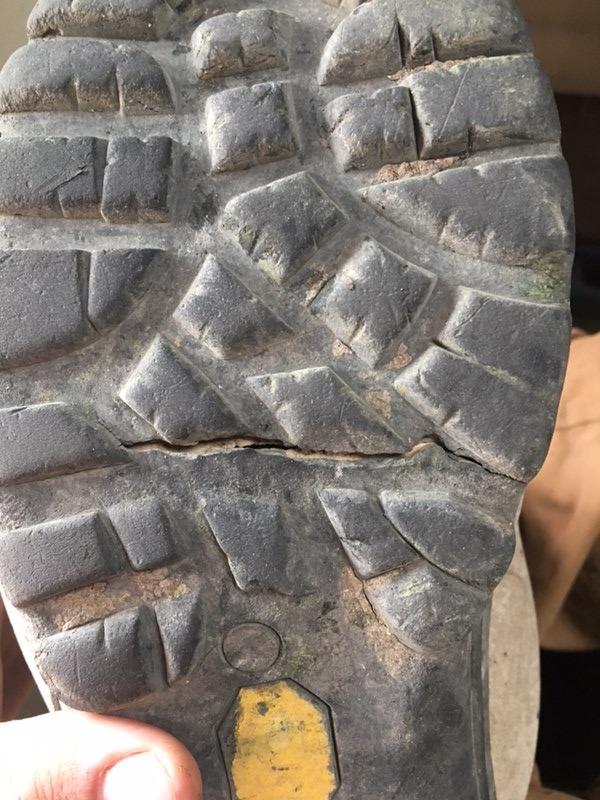
At $458.95 with only 1 left in stock, this is a specialty boot for those who need maximum protection and support. The significant break-in period requires patience but rewards with unmatched durability.
Wildland firefighters, serious alpinists, and those who prioritize durability over comfort.
Casual hikers, those needing immediate comfort, or climbers on a budget.
Waterproof: Sympatex
Upper: Full-grain leather
Weight: 4.23lbs
Features: Slip-resistant sole, E-Foam
The Alpina NUPTSE showcases European craftsmanship with its Sympatex waterproof membrane and full-grain leather construction. The stiff midsoles allow secure crampon use, making these boots suitable for technical mountaineering.
The E-Foam cushioning provides comfort during long treks, while the slip-resistant sole delivers excellent stability on challenging terrain. Customer reviews praise the boots’ durability and waterproofing.
At $249.00, these boots offer European quality at a reasonable price point. The 4.23-pound weight indicates serious construction for serious terrain.
Mountaineers valuing European craftsmanship, those needing reliable waterproofing, and climbers on moderate budgets.
Fast-and-light alpinists, those in warm climates, or climbers prioritizing weight savings.
Waterproof: Sympatex
Upper: 3.0mm split leather
Weight: 2.11lbs
Features: TPU ankle support, rubber rand
The Alpina DIABLO focuses on comfort without sacrificing performance. Many users claim these are the most comfortable boots they’ve ever worn, with the 3.0mm split leather providing durability and support.
The Sympatex membrane ensures 100% waterproof protection while remaining breathable. The TPU ankle support adds stability and safety during challenging ascents and descents.
At $239.00, the DIABLO offers excellent value for those prioritizing comfort. The semi-automatic crampon compatibility makes it suitable for most mountaineering applications.
Backpackers transitioning to mountaineering, climbers prioritizing comfort, and those on moderate budgets.
Those needing automatic crampon compatibility, climbers with wide feet, or mountaineers requiring maximum stiffness.
Waterproof: Sympatex
Upper: Nubuck leather
Weight: 4.25lbs
Features: VCP system, E-Foam cushioning
The Alpina NEPAL combines premium materials with innovative comfort features. The VCP (Volume Control Plate) system allows for a personalized fit, enhancing comfort during extended wear.
The 1930g heavy-duty structure provides stability and ankle support for demanding hikes and mountain ascents. The European craftsmanship is evident in the attention to detail and quality construction.
At $225.00, the NEPAL offers premium features at a competitive price point. The all-weather grip outsole delivers unbeatable traction on various surfaces.
Mountaineers valuing comfort features, those needing customizable fit, and climbers who appreciate European quality.
Weight-conscious climbers, those on tight budgets, or mountaineers needing maximum precision.
Waterproof: Sympatex
Upper: Textile
Weight: 3.48lbs
Features: VCP system, lightweight design
The Alpina CARABINER offers a balanced weight that allows easier uphill movement with less fatigue. The VCP (Volume Control Plate) system enables custom fit adjustments for precise foot control.
The Sympatex waterproof membrane provides full protection while remaining breathable. European manufacturing ensures quality control and ethical production standards.
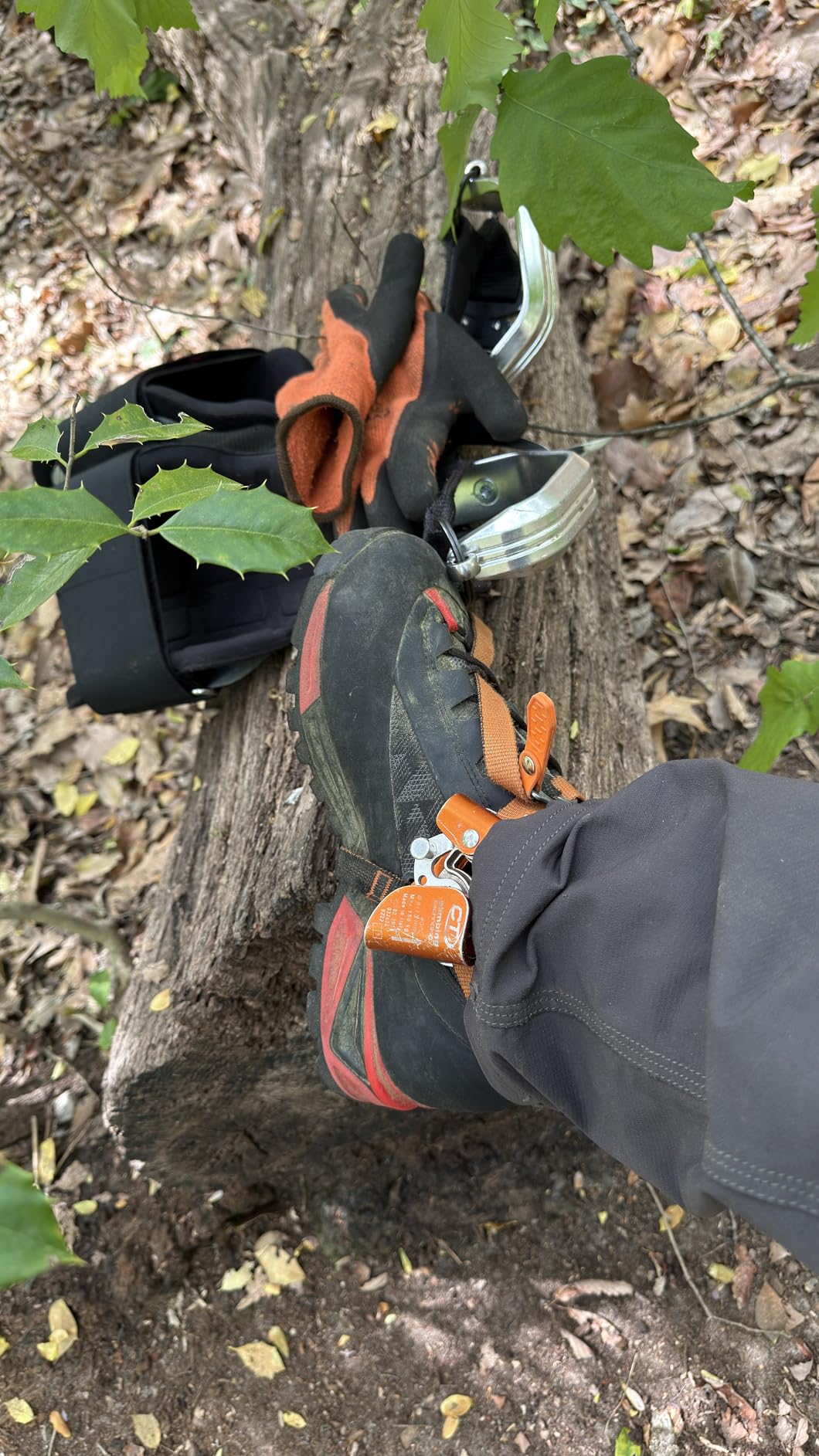
Customer photos show these boots in various settings, from mountain trails to urban environments. Users appreciate the versatility and styling that works for multiple activities.
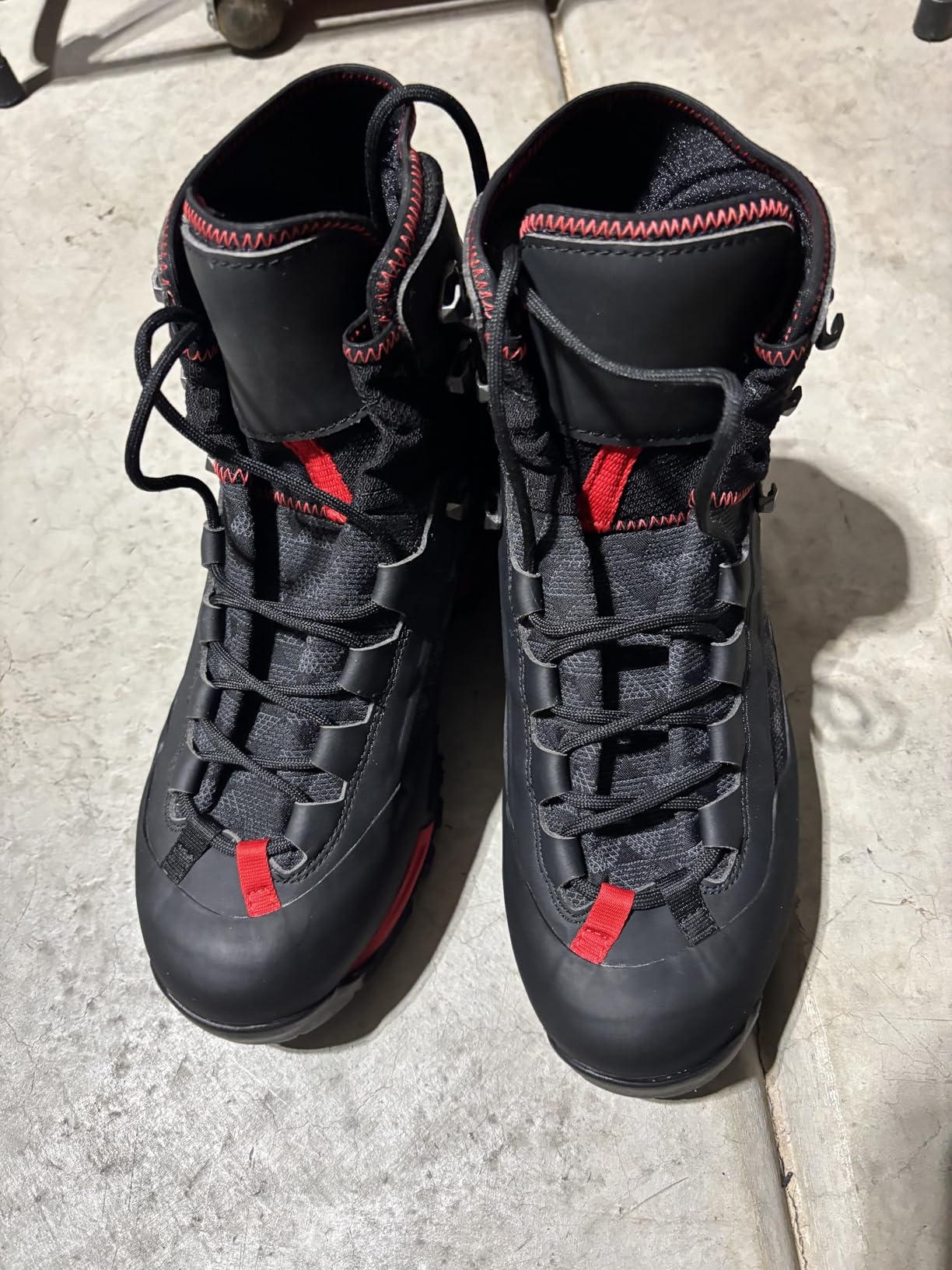
At $271.00, the CARABINER sits in the mid-range category. While some users report durability concerns after extended use, many find the lightweight design and comfort features worth the investment.
Those wanting a versatile boot for multiple activities, climbers prioritizing weight, and those who appreciate European manufacturing.
Mountaineers needing maximum durability, those on tight budgets, or climbers requiring heavy-duty construction.
Mountaineering boots are categorized using the B-rating system (B1, B2, B3), which determines their stiffness and crampon compatibility. Understanding these ratings is crucial for choosing the right boot for your objectives.
B1 Boots: Flexible hiking boots suitable for strap-on crampons only. Ideal for summer glacier travel and easy snow routes.
B2 Boots: Semi-stiff boots compatible with semi-automatic (hybrid) crampons. Perfect for general mountaineering and ice climbing.
B3 Boots: Fully rigid boots designed for automatic crampons. Essential for steep ice climbing and technical alpine routes.
| Boot Type | Best For | Crampon Type | Flexibility |
|---|---|---|---|
| Single Boot | 3-season mountaineering | Semi-automatic | Flexible to semi-stiff |
| Double Boot | Expedition & high altitude | Automatic | Stiff |
| Super Gaiter Boot | 8000m peaks | Automatic | Very stiff |
After seeing countless climbers make expensive mistakes, I’ve developed a systematic approach to boot selection. Follow these guidelines to find your perfect match.
Fit trumps all other considerations. I’ve seen $700 boots fail because of poor fit, while $100 boots performed perfectly when sized correctly. Here’s how to get it right:
Choose insulation based on your typical climbing conditions, not the worst-case scenario:
Most boots use one of three waterproofing systems:
⏰ Time Saver: Leather boots can be waterproofed with wax treatments, extending their life and improving performance. Synthetic boots rely on membranes that can fail over time.
Premium boots often cost less in the long run:
The La Sportiva Nepal Cube GTX offers the best overall performance for technical mountaineering, while the La Sportiva Makalu provides exceptional durability for heavy use. For beginners, the Salewa Mountain Trainer offers the best balance of price and performance.
La Sportiva and SCARPA are widely considered the top mountaineering boot manufacturers, with Italian craftsmanship setting the standard. Salewa and Asolo offer excellent alternatives with different fit characteristics and price points.
For 8000m peaks, you’ll need double boots like the La Sportiva Olympus Mons or Millet Everest. These feature removable liners, extreme insulation rated to -60°C, and are compatible with automatic crampons for steep ice sections.
B2 boots are semi-stiff and work with semi-automatic (hybrid) crampons, making them versatile for general mountaineering. B3 boots are fully rigid and require automatic crampons, providing maximum precision for steep ice climbing and technical alpine routes.
Mountaineering boots are specifically designed for snow, ice, and technical terrain with stiffer soles for crampon compatibility and better ankle support. Hiking boots prioritize flexibility and comfort on trails. Use hiking boots for simple trails and mountaineering boots when you need crampons or face technical terrain.
The KEEN Targhee 4 Mid is specifically designed with a wide toe box and is ideal for those with wider feet. Asolo boots generally run wider than Italian brands like La Sportiva and SCARPA. Always try boots on as sizing varies significantly between brands.
The Columbia Newton Ridge Plus II at under $100 offers the best entry point for beginners. The KEEN Targhee 4 Mid and Alpina models provide mid-range options with better performance. Look for sales on previous year’s models from premium brands for excellent value.
With proper care, quality mountaineering boots last 5-10 years. Resoleable models like the La Sportiva Makalu can be rebuilt multiple times, extending their life significantly. Regular cleaning, drying, and occasional re-waterproofing are essential for longevity.
After spending decades in these boots across six continents, I’ve learned that the “best” boot depends entirely on your objectives. Don’t let gear snobs convince you that you need $800 expedition boots for summer glacier travel.
For most mountaineers, the Salewa Mountain Trainer offers the perfect balance of performance, comfort, and value. Serious alpinists should invest in the La Sportiva Makalu for its unmatched durability and resoleable construction. Beginners will find everything they need in the Columbia Newton Ridge II while they discover their true commitment to the sport.
Remember: the boot that fits well and matches your objectives will always outperform the expensive boot that doesn’t. Try before you buy, consider your typical conditions rather than worst-case scenarios, and invest in quality socks to complete your system.
Your feet will thank you on summit day.
